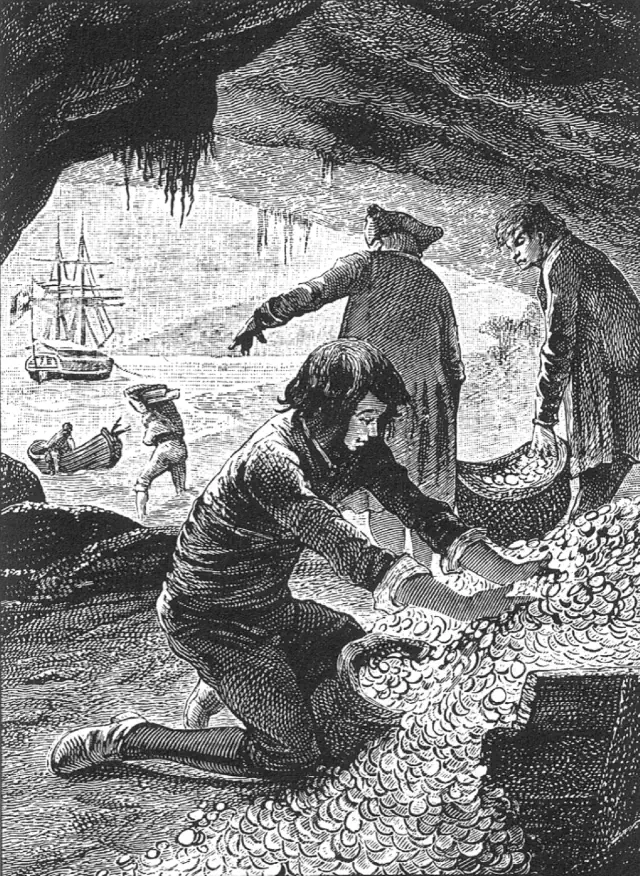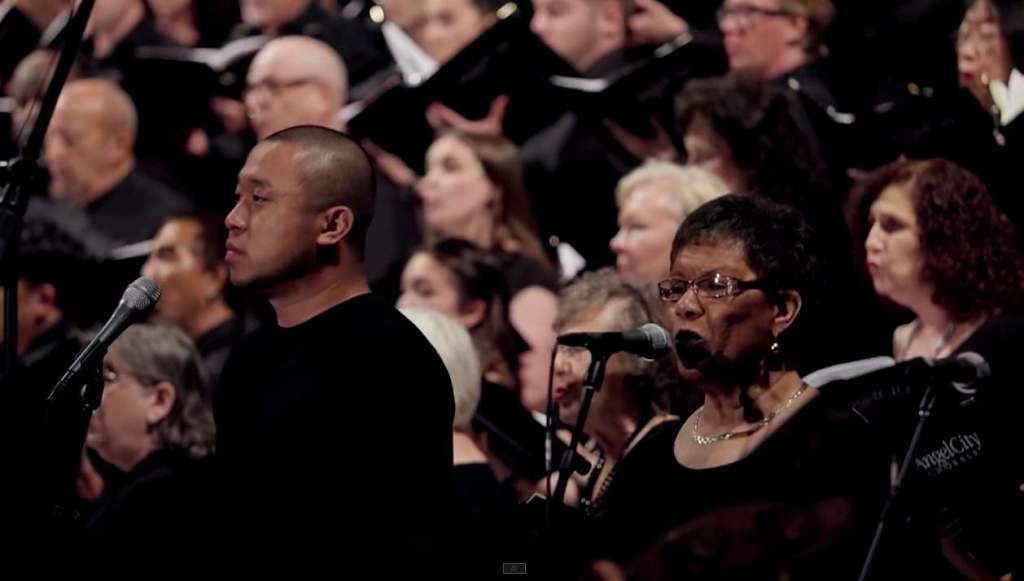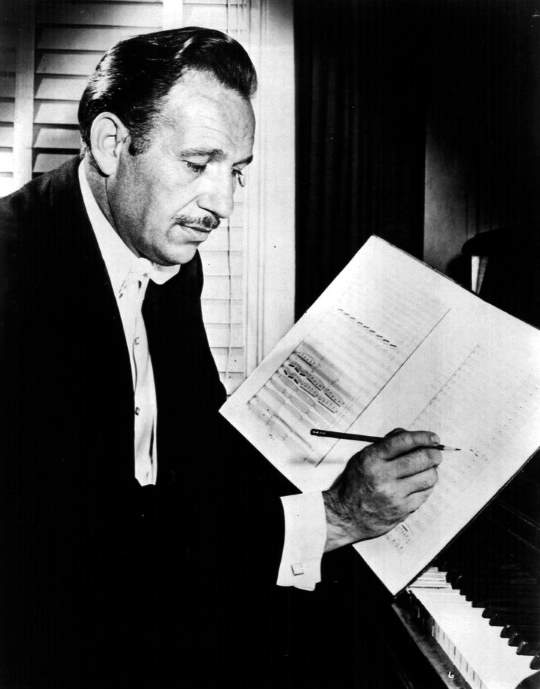The most realistic and accurate version of the all-time pirate tune “Dead Man’s Chest” (also known as Fifteen Men On The Dead Man’s Chest or Derelict). From the 1959 Roger Wagner Chorale recording of Sea Shanties. Soloist: Harve Presnell, the American actor, and singer.
Fifteen men (Dead Man’s Chest)
It is actually a fictional sea song, originally from Robert Louis Stevenson‘s novel Treasure Island (1883). It was expanded in a poem, titled Derelict by Young E. Allison, published in the Louisville Courier-Journal in 1891. It has since been used in many later works of art in various forms.
The song depicts a confrontation between 5 men, all of which kill each other over the gold. 5 characters- The mate stabs the bosun with a marlinspike in the head after the bosun stabs him with a bosuns pike. We can assume the skipper (skipper would have no weapon) uses his hands to strangle the cook (cookey) who stabs the scullion (cooks have knives). The dishwasher (scullion) has the axe (as typical firefighting gear is located near the ship’s mess). He axes the skipper who is strangling the cook.
10 people are left onboard and are surprised at first at what they see but quickly realize they get a bigger share. they drink up, toast, and are happy. thus “drink and devil and done with the rest”
In Treasure Island Stevenson only wrote the chorus, leaving the remainder of the song unwritten, and to the reader’s imagination:
“Fifteen men on the dead man’s chest–
…Yo-ho-ho, and a bottle of rum!
Drink and the devil had done for the rest–
…Yo-ho-ho, and a bottle of rum!”
Another lyric in the novel, near its end:
“But one man of her crew alive,
What put to sea with seventy-five.”
Stevenson does not make clear if this lyric is part of Dead Man’s Chest or another fictional song entirely. Regardless, the words of the lyrics help advance the storyline.

Fifteen Men (Dead Man’s Chest) lyrics
Fifteen men on a dead man’s chest
Yo ho ho and a bottle of rum
Drink and the devil had done with the rest
Yo ho ho and a bottle of rum
The mate was fixed by the bosun’s pike
The bosun brained with a marlinespike
And cookey’s throat was marked belike
It had been gripped by fingers ten;
And there they lay, all good dead men
Like break o’day in a boozing ken
Yo ho ho and a bottle of rum!
Fifteen men of the whole ship’s list
Yo ho ho and a bottle of rum!
Dead and be damned and the rest gone whist!
Yo ho ho and a bottle of rum!
The skipper lay with his nob in gore
Where the scullion’s axe his cheek had shore
And the scullion he was stabbed times four
And there they lay, and the soggy skies
Dripped down in up-staring eyes
In murk sunset and foul sunrise
Yo ho ho and a bottle of rum!
Fifteen men of ’em stiff and stark
Yo ho ho and a bottle of rum!
Ten of the crew had the murder mark!
Yo ho ho and a bottle of rum!
Twas a cutlass swipe or an ounce of lead
Or a yawing hole in a battered head
And the scuppers’ glut with a rotting red
And there they lay, aye, damn my eyes
Looking up at paradise
All souls bound just contrawise
Yo ho ho and a bottle of rum!
Fifteen men of ’em good and true –
Yo ho ho and a bottle of rum!
Ev’ry man jack could ha’ sailed with Old Pew,
Yo ho ho and a bottle of rum!
There was chest on chest of Spanish gold
With a ton of plate in the middle hold
And the cabins riot of stuff untold,
And they lay there that took the plum
With sightless glare and their lips struck dumb
While we shared all by the rule of thumb,
Yo ho ho and a bottle of rum!
More was seen through a sternlight screen…
Yo ho ho and a bottle of rum
Chartings undoubt where a woman had been
Yo ho ho and a bottle of rum.
‘Twas a flimsy shift on a bunker cot
With a dirk slit sheer through the bosom spot
And the lace stiff dry in a purplish blot
Oh was she wench or some shudderin’ maid
That dared the knife and took the blade
By God! she had stuff for a plucky jade
Yo ho ho and a bottle of rum!
Fifteen men on a dead man’s chest
Yo ho ho and a bottle of rum
Drink and the devil had done for the rest
Yo ho ho and a bottle of rum.
We wrapped ’em all in a mains’l tight
With twice ten turns of a hawser’s bight
And we heaved ’em over and out of sight,
With a Yo-Heave-Ho! and a fare-you-well
And a sudden plunge in the sullen swell
Ten fathoms deep on the road to hell,
Yo ho ho and a bottle of rum!

Related: Angel City Chorale sings “Baba Yetu”
Roger Wagner
Roger Wagner, KCSG (January 16, 1914 – September 17, 1992) was an American choral musician, administrator, and educator.
He was born in Le Puy, France on January 16, 1914, and died on September 17, 1992, in Dijon, France. His younger brother was actor and voiceover artist Jack Wagner.

Roger Wagner was immersed in music from his younger years. His father was an organist of the cathedral in Dijon, France, and subsequently in Los Angeles, after emigrating to the United States in 1921. At the age of 12, he assumed his first musical position in his own right, serving as organist at St. Ambrose Church in West Hollywood.
In 1937, Wagner joined the MGM chorus in Hollywood and was subsequently appointed Music Director of St. Joseph’s Church in Los Angeles where he established an outstanding choir of men and boys, including a young Paul Salamunovich.
In 1945, Roger Wagner became the supervisor of young choruses for the City of Los Angeles, most notably the “Los Angeles Concert Youth Chorus.” It was from a madrigal group of twelve of these singers that the Roger Wagner Chorale was born in 1946.
The Roger Wagner Chorale became recognized the world over through its numerous radio, concert, and television appearances, motion picture soundtracks The Gallant Hours, and more than eighty recordings (they were also famous for singing the theme song and “score” for I Married Joan).
The Virtuoso recording won a Grammy Award and the popular carol recording Joy to the World was a Gold Record Album, selling more than a half-million copies. The Chorale toured all over the world and included such outstanding singers as Marilyn Horne, Marni Nixon, Claudine Carlson, Harve Presnell (on several recordings), Salli Terri (on several recordings as well as researching for several of the LP liner notes), Earl Wrightson and Carol Neblett.
In 1964, on completion of the Los Angeles Music Center, Wagner and representatives of the Junior Chamber of Commerce formed a resident choral ensemble, the Los Angeles Master Chorale, which became a resident company of the Music Center alongside the Los Angeles Philharmonic.
Credits include a performance with Eugene Ormandy and the Philadelphia Orchestra in the Presidential Inaugural at the Kennedy Center in 1973 and a tour of the Soviet Union as a United States State Department “cultural ambassador” in 1974. Wagner served as the Chorale’s Music Director for 22 years until he was named Music Director Laureate.
Sources
- Dead Man’s Chest on Wikipedia
- Roger Wagner on Wikipedia
